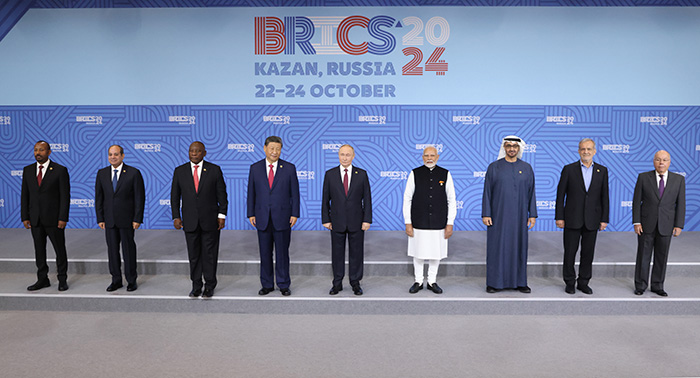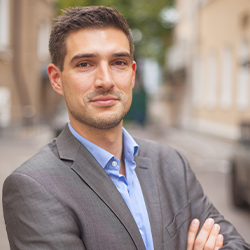Interviews
24 October 2024
BRICS+ Summit in Kazan: What Direction for Russian Foreign Policy?

From October 22 to 24, the Russian city of Kazan hosted the 16th BRICS meeting, marking the first summit since the organisation expanded from five to nine members. The “club” of non-Western powers appears particularly attractive, with around thirty countries expressing interest in joining. As its ties with Western nations seem irreparably damaged, what role does Russia play within the “Global South”? Does hosting the summit in Kazan reflect a specific strategy? How does the Russian population view Moscow’s diplomatic course? Insights from Igor Delanoë, Deputy Director of the Franco-Russian Observatory and a PhD in History.
Russia is hosting the BRICS+ summit from October 22 to 24, 2024. What significance does this summit hold within Russian foreign policy, particularly in relation to its ties with the West? Does it represent a step towards a “way out” of Russia’s “partial isolation” on the international stage?
The BRICS+ summit in Kazan demonstrates, if proof were still needed, that Russia is not as isolated as claimed in the West. Thirty-two countries are participating in the Kazan summit, including 24 heads of state and government, while around 30 others have expressed interest in cooperating with BRICS+. Russia and the West have mutually isolated each other. Since February 2022, Russia has not only maintained its relations with the rest of the world but has also sought to expand and structure them, particularly around major events. This was evident during the Russia-Africa summit in 2023 and the Russia-Islamic World economic forum, also held in Kazan last May. It is expected to be further underscored next month in Sochi during the first meeting of foreign ministers at the Russia-Africa Forum.
Moreover, the Kazan summit highlights the evolving relationship between Moscow and what Russians refer to as the “Global Majority.” This concept, which emerged in Russian academic discourse in 2022-2023, has been adopted by Russian officials as a counterpoint to the well-established notion of the “Collective West.” For instance, Russia has observed, through various United Nations Security Council votes on Ukraine since February 2022, that countries in the so-called “Global South” have chosen to maintain their distance from the conflict. The nuanced positions taken by African, Asian, Middle Eastern, and South American capitals on the Ukrainian crisis are perceived by the Kremlin as a diplomatic asset in its foreign policy.
The BRICS+ summit is taking place in Kazan, the capital of Tatarstan, a Russian region predominantly populated by the Tatar Muslim minority. Following the 15th Kazan Forum held in the same city, does this choice of location reflect Russia’s intention to pivot further towards the Islamic world? To what extent does Islam represent a domestic political issue in Russia?
The Republic of Tatarstan, along with regions like Chechnya, is among the few subjects of the Federation that engage in complementary diplomacy within the frameworks set by Moscow. The head of Tatarstan, Rustam Minnikhanov—referred to as raïs since last year—has made several trips to the Middle East over the past decade, with an agenda primarily focused on economic diplomacy. Kazan, like Sochi, is one of the major regional cities that the Kremlin aims to establish as hubs for its diplomacy with countries of the Global South.
In Tatarstan’s case, the religious vector is particularly utilised, especially as Russia has not hesitated to present itself since Vladimir Putin’s first term as an “Islamic power.” It is worth noting that over 20 million Russian citizens are Sunni Muslims, and Islam is an indigenous religion with a centuries-old presence along the Volga River and in the Caucasus. Moscow has held observer status at the Organisation of Islamic Cooperation (OIC) since 2005. While this positioning can be seen as an asset in foreign policy, it has also been perceived as a vulnerability by Russian authorities, who have long feared potential connections between segments of this vast community and extremist movements based in Afghanistan and the Middle East.
The March attack on Crocus City Hall in Moscow, claimed by the Islamic State Khorasan Province, heightened hostility towards migrants—the assailants were of Tajik origin—even as the country faces a labour shortage in its overheated economy. The surge in anti-migrant initiatives prompted a reaction from Chechen leader Ramzan Kadyrov in early October, who expressed “concern” over the tone of the discourse, which he believes fuels hatred against migrants within society.
Alongside this summit, how are Russia’s foreign policy and its status on the international stage perceived by the Russian population?
After the initial shock and disbelief, Russian society has adapted to the new post-February 2022 reality and its dynamics. The media consistently project an image of the country’s strength: visits by foreign officials, military exercises, the economy’s resilience to sanctions, and reports from the front lines. The hostility between Russia and the West is reflected in opinion polls, along with a “new friendship” with China and India, while Belarus is portrayed as a steadfast ally.
That said, young Russians are not rushing to learn Mandarin or Farsi, and Western authors remain widely read, alongside Russian classics. Nevertheless, the conflict and propaganda have had their impact. According to the Levada Center (designated a foreign agent by Russian authorities), while 87% of respondents expressed a “very good” or “somewhat good” opinion of France in July 2003, only 20% did so in September 2024—a figure that still seems relatively high. These numbers indicate that Russia has, at best, entered a phase of indifference towards the West, likely to persist beyond the end of hostilities in Ukraine.
While the break in relations with the West has been largely accepted, there is no widespread enthusiasm in society for the “pivot to the East” pursued by the authorities. It is viewed more as a necessity than a choice. Opinion polls suggest that society as a whole—not just in Moscow and Saint Petersburg—does not seem to question the general direction the country is taking. Although people no longer harbour high expectations for the future, their overall mindset remains combative, resilient, and often tinged with fatalism.

